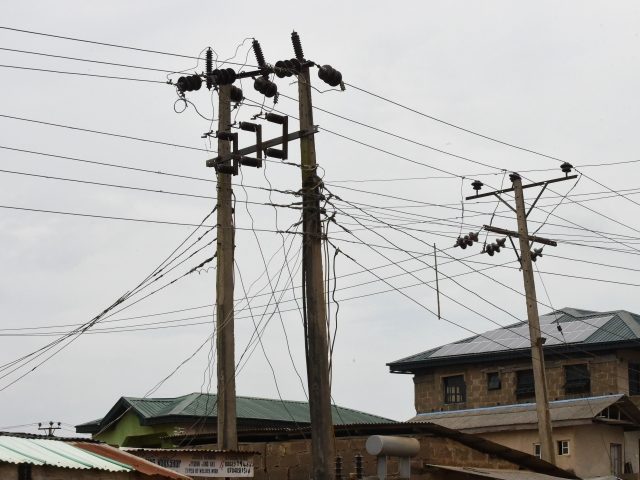All-day blackouts, skyrocketing gasoline and diesel prices, and an unreliable, nearly absent government are fueling demand for solar power in Nigeria, the local This Day newspaper reported on Wednesday, as businesses seek ways to continue to function without relying on the state-run power grid.
President Muhammadu Buhari – already facing widespread condemnation for the rise in jihadist, anti-Christian violence during his tenure – has done little to address mounting power grid failures, partially due to government incompetence and partially due to deliberate attacks on grid infrastructure by unspecified “bandits.” Buhari has also failed to harness the full potential of Nigeria’s abundant oil reserves. Nigeria is an OPEC member nation, the largest economy in Africa, and its largest oil producer, but it has little to no capacity to refine the oil it has, forcing it to sell crude abroad and buy refined oil at a higher price.
Dependence on foreign gasoline and diesel has resulted in tremendous shortages across the country as a result of the global supply being limited in the aftermath of the Russian invasion of Kyiv, following eight years of occupation in Ukraine, in February. The situation has made maintaining a business in Nigeria nearly impossible – prompting businessowners to build alternative solar generators and seek other energy sources to stabilize their operations.
“Nigeria, Africa’s largest economy with a population of more than 200 million people, has an installed electricity capacity of 12,500 megawatts but the national grid only provides 4,000 MW at peak, leaving businesses and citizens heavily reliant on diesel-powered generators,” This Day explained on Wednesday. “The price of diesel, which is not subsidised like petrol [gasoline], has nearly tripled to N800 a litre ($1.93) or even higher in some areas in the country.”
Growing demand for solar generators to avoid having to buy diesel is outpacing the ability of the national market to meet demand, the newspaper reported, adding that most businesses appear to be considering solar out of need – because no reliable alternative exists in Nigeria – not out of concern for carbon emissions or the environment.
“Power outages for more than 12 hours a day means companies in Nigeria have to fend for themselves,” Bloomberg explained in a report on Wednesday. “Poor maintenance and insufficient investment in the transmission network have resulted in only about a third of the country’s installed capacity being dispatched by the grid daily – a fraction of what’s needed in a nation of more than 200 million people.”
Vanguard, another Nigerian newspaper, reported that the demand for solar will likely be — at best — a long-term solution, and the nation awoke on Wednesday to long lines at a dwindling number of functional gas stations for petrol or diesel. The country’s largest cities, such as the capital Abuja and the sprawling southern metropolis Lagos, attracted long lines of individuals with “jerrycans” looking to fuel their personal generators, as the state-run power grid was not an option to offer electricity.
The newspaper observed that some areas counted on appropriate supplies of fuel but could not efficiently distribute it to gas stations as Muslims in Nigeria are celebrating the Eid-el-Kabir holiday.
Nigeria has spent much of the year without reliable access to electricity. By June, halfway through the year, the power grid had failed at a national level at least six times. The situation has deteriorated since.
The Buhari administration has taken no responsibility for the situation. In remarks in June, the chairman of the Nigerian Electricity Regulatory Commission, Sanusi Garba, gave a speech in which he listed the various reasons Nigeria no longer has electricity, summarized by Vanguard in part as “poor generation by generation companies, GenCos, attacks on transmission towers, and low water levels at hydro power plants.”
The attacks by “bandits,” a term Nigerian reporters often use to refer to ethnic Fulani jihadist groups but could also be used for other semi-organized criminals, broke the power grid nationally at least five times this year. The attacks were, in some cases, sophisticated, as Vanguard narrated in June:
Just near Osogbo in Osun state, vandals brought welding machines, hacked and fell two towers on the brand new 330kV Osogbo to Akure power transmission line, causing a delay in the project execution.
And in Ogun state, three transmission towers collapsed recently on the 132kV Papalanto/Ojere double-circuit transmission line after they were vandalized, causing power outage around Abeokuta and its environs. Again, TCN quickly moved and fixed the constraint while restoring bulk power to the affected area.
Popular outrage did not abate in the face of the government’s attempted explanations.
“Nigerians are now used to incessant grid collapses in the power sector, occurring mostly at weekends and public holidays, with no clear explanation as to the causes,” Joy Ogaji, the executive secretary of Nigeria’s Association of Power Generation Companies, told Vanguard at the time. “Arguably, electricity forms an indispensable part of modern life, especially at weekends when families try to catch up and relax.”
The national interest in solar power could result in a windfall for China, an ally of Nigeria’s and the world’s heavyweight solar panel manufacturer. The Buhari administration announced in December its intent to establish a “renewable energy research center” in the country in partnership with the Chinese Communist Party, which uses Uyghur slave labor to manufacture solar panels and other lucrative goods. Nigeria is a member of China’s Belt and Road Initiative (BRI), a scheme in which China offers predatory loans to poor countries to ensnare them in debt and seize their assets.
“The proposed partnership between the Chinese and Nigerian universities is expected to build and upgrade centres of excellence in renewable energy technologies which include green energy – solar, wind, hydro, bio-energy, energy efficiency and management,” an official statement from the Nigerian government last year read. The Chinese government donated an initial order of solar panel equipment at the time as part of the BRI.

COMMENTS
Please let us know if you're having issues with commenting.